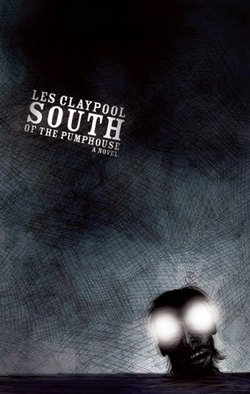Читать книгу South of the Pumphouse - Les Claypool - Страница 16
На сайте Литреса книга снята с продажи.
ОглавлениеChapter 9
WELCOME TO EL SOBRANTE
HONK!! HONK!!
Ed’s thoughts were interrupted by a loud air horn from a big Chevrolet pickup. Ed looked in the rearview mirror and saw the grill looming close.
“Go around, you fucking cock,” he muttered into the mirror.
The pickup charged past on the left.
“Asshole.”
Ed pulled off the freeway at the San Pablo Dam Road exit and turned right, heading east. He hadn’t gone very far when an object caught his eye, something that had never really struck him as significant until this moment. It was a big wooden sign that ornately proclaimed, WELCOME TO EL SOBRANTE. Weathered by time, the sign stared back at Ed like an old acquaintance, like a smell that was distinctly familiar but not reminiscent of any one thing in particular, evoking a broad range of memories and emotions. Ed knew that this was just the tip of the homecoming iceberg. More than likely, a plethora of old feelings, good and ill, would rush back over him during the course of the day.
Driving down Dam Road, Ed was intrigued by the look of his old hometown. Many things had changed, some more or less subtly than others. The old A&W was still here, though suffering from a bad makeover. Like most defunct franchises, this particular venue was merely a skeleton of its former self. Generic fast-food chicken nuggets and low-grade falafels and gyros now replaced the glorious root beer floats and burgers of Ed’s childhood. Kitty corner to the A&W stood the Shell station where Ed had worked the last two years of high school, but like the rest of its kind, the “service” had been taken out of “service station,” leaving a pump-it-yourself gas-and-snack bar.
Further up the road on the right was the old Park Theater Cinema, long since turned into the Christian Life Center. When Ed and Earl were kids, their parents had purchased summer passes to the cinema for five dollars each. The package allowed the bearer entrance to the cinema every Wednesday afternoon. The films shown were mainly old “B” comedies from the ’60s, many of which featured Don Knotts. Most of the town’s parents took advantage of this day care value; the room was filled every Wednesday with nearly every kid from Ed’s school, while the local taverns simultaneously experienced a large influx of house moms.
As he continued toward his destination, Ed was nearly overwhelmed by old sights and phantom memories. He passed the Jack in the Box where, on weekends, he and his friends used to hang out on the hoods of their cars and drink beer covertly through straws in cups labeled for soft drinks. He passed the Red Onion hamburger stand, in front of which a good friend of his had been killed in a motorcycle crash, just one year out of high school. He saw the old church parking lot where he and one of his high school girlfriends were caught naked late one night in his car by a particularly perverse officer of the law who made a habit of sneaking up on the local make-out spots with his headlights off. The Val-Market, Sonny’s Hideaway, Fowler’s Department Store, and Adachi’s Florists—each location evoked multiple memories and experiences.
Ed realized that it had been some time since he had felt the slightest bit of nostalgia for his hometown. Perhaps enough water had finally passed under the bridge to dull the sharp pang that crept into his belly whenever he thought about his youth. Not that his past was filled with dreadful experiences; quite the contrary. It was a growing resentment of the town’s overall conservatism that had eventually driven him away, not his actual childhood experience. White guilt, he thought. The recent passing of his father had compelled him to revisit some of these memories, and the trip to see his older brother now brought him back to the physical surroundings of his childhood.
Ed had never visited his brother’s current home, but he knew the house itself. At the funeral, his brother had remarked to him that he had bought the old Ramsey house on the corner just two blocks up from their parents’ place. The Ramsey house was somewhat infamous for the boys. In the late ’60s and early ’70s, it was widely known around the neighborhood as the house where the bikers hung out. Ed had first heard the term Hell’s Angels in reference to the pack of leather-clad, longhaired men who regularly converged in the Ramsey’s driveway to drink beer and tune their loud bikes.
As he drew closer to his destination, Ed realized that he was growing genuinely excited about the day and the adventures that an old-time sturgeon trip with his older brother might bring.
He pulled up to the house and parked behind Earl’s pickup. Though he had never seen the truck before, he knew immediately that this particular vehicle, a well-kept, older-model Ford, belonged to his brother. On the bumper, bold black letters on a mustard yellow sticker proclaimed: A WOMAN’S PLACE IS ON MY FACE.
